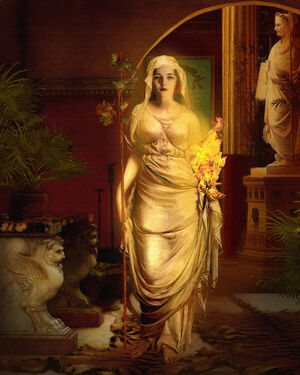
Meet the Romans

Vesta
The major Gods of the Roman pantheon include the Dii Consentes, the Dii Familiares as well as many other Gods.
People following the Roman way to the Gods usually focus their practice on particular Gods, such as household Gods and patron Gods - that is Gods who may assist individuals in a chosen area. For example, merchants may particularly honour Mercury, artisans may particularly honour Minerva and those seeking happiness in love may especially honour Venus.
Dii Consentes[]
The Dii Consentes are the twelve principal Gods of the Roman pantheon. They are:
- Apollo - God of the sun, sunlight, truth, prophecy, health, music and archery.
- Ceres - Goddess of agriculture, especially fertile grain crops.
- Diana - Goddess of the moon, the hunt, wild animals, woodland, mountains and virginity.
- Juno - Goddess of married women and motherhood.
- Jupiter - God of the sky, storms and thunder.
- Mars - God of war and military valour.
- Mercury - God of financial gain, trade, travel, communication, eloquence and cunning.
- Minerva - Goddess of craftsmandship, intellectual pursuits (especially philosophy) and strategy.
- Neptune - God of water and horses.
- Venus - Goddess of sex and fertility; sexual love, desire, beauty, charm and pleasure.
- Vesta - Goddess of sacrificial fire and the heathfire, proctector of the home and the family.
- Vulcan - God of fire, smithery and volcanoes.
Dii Familiares[]
The Dii Familiares are the Gods of the household. The main Gods of the household are:
- Dii Manes - spirits of the dead, especially ancestors.
- The Genius (or Juno) of the head of the family.
- Janus - God of doorways.
- The Lares - guardian spirits of the home.
- The Penates - guardian spirits of the pantry and food stores.
- Vesta - Goddess of the heathfire.
The home is usually the centre of the Religio Romana - wherein household shrines, now conventionally referred to as larariums, are established and rituals performed thereon. Larariums are principally shrines that honour the Lares, however other deities - including other household deites and patron God deities - may also be honoured on household shrines. Larariums might also include commemoration and/or rituals in honour of family ancestors.
Other Gods of Significance[]
While the Dii Consentes and the Dii Familiares are often the Gods most revered within the Roman pantheon numerous other Gods are also revered - including Gods not indigenous to Rome. These Gods may include but are not restricted to:
- Bacchus - God of viticulture, wine, spiritual ecstasy/freedom as well as delusions and madness.
- Bona Dea - associated with fertility and the protection of women generally.
- Faunus - horned God of flocks, fields and fertility.
- Flora - Goddess of fertility, flowers and spring.
- Fortuna - Goddess of fortune and luck.
- Hercules - God of strength and perseverence.
- Isis - Egyptian Goddess who is associated, inter alia, with giving protection to the downtrodden. She was a particularly popular Goddess during the Roman Empire.
- Janus - God of beginnings, endings, transitions and doorways.
- Magna Mater - the "Great Mother" earth Goddess. Also known as Cybele. She was a particularly popular Goddess during the Roman Empire.
- Nox - Goddess of the night.
- Pax - Goddess of peace.
- Pluto - God of death, the underworld and mineral wealth. Also known as Dis Pater. His consort is Proserpina.
- Pomona - Goddess of orchards.
- Priapus - rustic fertility God.
- Robigo - Goddess of wheat rust, Robigo can therefore protect crops from wheat rust (a fungal disease).
- Saturn - agricultural fertility God.
- Terminus - God of boundaries.
- Trivia - Goddess of witchcraft and the three way crossroads. More often called by her Greek name Hekate (or Hecate).
- Victoria - Goddess of victory.